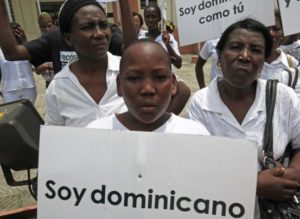
The crisis has been triggered by a Dominican Republic constitutional court ruling that threatens a devastatingly disparate impact on many thousands of people descended from Haitian immigrants who live in that republic.
The ruling, which is not subject to appeal, denies citizenship rights to an estimated 200,000-plus residents born in the country but to Haitian parents. Suddenly, this segment of the population appears to have been reduced to statelessness.
People born in the Dominican Republic, with nowhere else to call home, have been plunged into bewilderment, in desperate hope that the international community will come to their rescue. “Soy Dominicano, (I am Dominican),” say placards raised in protest against the ruling.
Already, the Geneva-based office of the United Nations High Commissioner for Human Rights has called on Santo Domingo authorities to ensure that the ruling is not so interpreted as to leave Haitian-descended persons in “constitutional limbo.” Such an outcome, with its apartheid-like associations, will inevitably stain the international image of the Dominican Republic.
This is especially likely since long-standing race and color differences between mostly black Haitians, and mixed-race Dominicans, have strained relations between the two Caribbean nations that share the island of Hispaniola. Dominican generosity was notably forthcoming immediately after the 2010 earthquake that killed 300,000 and left homeless some 1.5 million Haitians.
The constitutional judgment opens a new chapter in the troubled history of relations between the two republics. With support from the international community, the ruling is likely to be challenged through the Inter-American Commission on Human Rights, and the Inter-American Court of Human Rights.
Meanwhile, Santo Domingo authorities have suggested that the Dominican-born Haitian descendants may apply for residency, and then citizenship. This approach must be seen as conferring second-class citizenship on people born and bred in the Dominican Republic, who have also contributed to its agricultural and economic development.
Inevitably, the Caricom secretariat Persad-Bissessar has adopted a wait-and-see approach. For it is political leadership that must drive the shaping and execution of Caricom policy toward this new burning issue in the northern Caribbean.
Source: Trinidad Express

